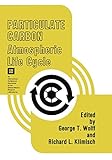Particulate carbon: atmospheric life cycle [Libro electrónico] / edited by George T. Wolff, Richard L. Klimisch
Wolff, George T [editor] | Klimisch, Richard L [editor/a].
Tipo de material: Libro
en línea Editor: New York, New York, United States: Plenum, c1982Descripción: x, 411 páginas : ilustraciones ; 26 centímetros.ISBN: 0306409186; 9781468441567 (Print); 9781468441543 (Online).Tema(s): Air -- Pollution -- Congresses | Soot -- CongressesNota de acceso: Disponible para usuarios de ECOSUR con su clave de acceso Nota de bibliografía: Incluye bibliografía e índice: páginas 409-411 Número de sistema: 55492Contenidos:Mostrar
Resumen:
Libro
en línea Editor: New York, New York, United States: Plenum, c1982Descripción: x, 411 páginas : ilustraciones ; 26 centímetros.ISBN: 0306409186; 9781468441567 (Print); 9781468441543 (Online).Tema(s): Air -- Pollution -- Congresses | Soot -- CongressesNota de acceso: Disponible para usuarios de ECOSUR con su clave de acceso Nota de bibliografía: Incluye bibliografía e índice: páginas 409-411 Número de sistema: 55492Contenidos:Mostrar
Resumen:| Tipo de ítem | Biblioteca actual | Colección | Signatura | Estado | Fecha de vencimiento | Código de barras |
|---|---|---|---|---|---|---|
| Libros | Biblioteca Electrónica Recursos en línea (RE) | Acervo General | Recurso digital | ECO400554926552 |
Incluye bibliografía e índice: páginas 409-411
Chapter 1. The importance of particulate elemental carbon.. Chapter 2. Analytical measurement techniques and chemistry of elemental carbon.. Chapter 3. Sources of carbon.. Chapter 4. Ambient measurements.. Index
Disponible para usuarios de ECOSUR con su clave de acceso
This book contains the papers and discussions from the symposium, "PARTICU LATE CARBON: Atmospheric Life Cycle," held at the General Motors Research Laboratories on October 13-14, 1980. This symposium, which focused on atmospheric particulate elemental carbon, or soot, was the twenty-fifth in this series sponsored by the General Motors Research Laboratories. The present symposium volume contains discussions of the following aspects of particulate elemental carbon (EC): the atmos pheric life cycle of EC including sources, sinks, and transport processes, the role of EC in atmospheric chemistry and optics, the possible role of EC in altering climate, and measurement techniques as well as ambient concentrations in urban, rural, and remote areas. Previous symposia have covered a wide range of scientific and engineering subjects. Topics are selected because they are new or represent rapidly changing fields and are of significant technical importance. It is ironic that the study of particulate elemental carbon or soot should meet the above criteria for selection because soot, especially from coal and wood combustion, has been a recognized air pollutant for centuries. However, since the 1950s, when intense efforts to study air pollution were initiated, to until a few years ago, the role of elemental carbon in the atmosphere was largely ignored. The major reason for this was the lack of a suitable measurement technique. eng
Disponible en línea
Disponible en formato PDF
Subscripción a ELSEVIER 26 de diciembre del 2013
